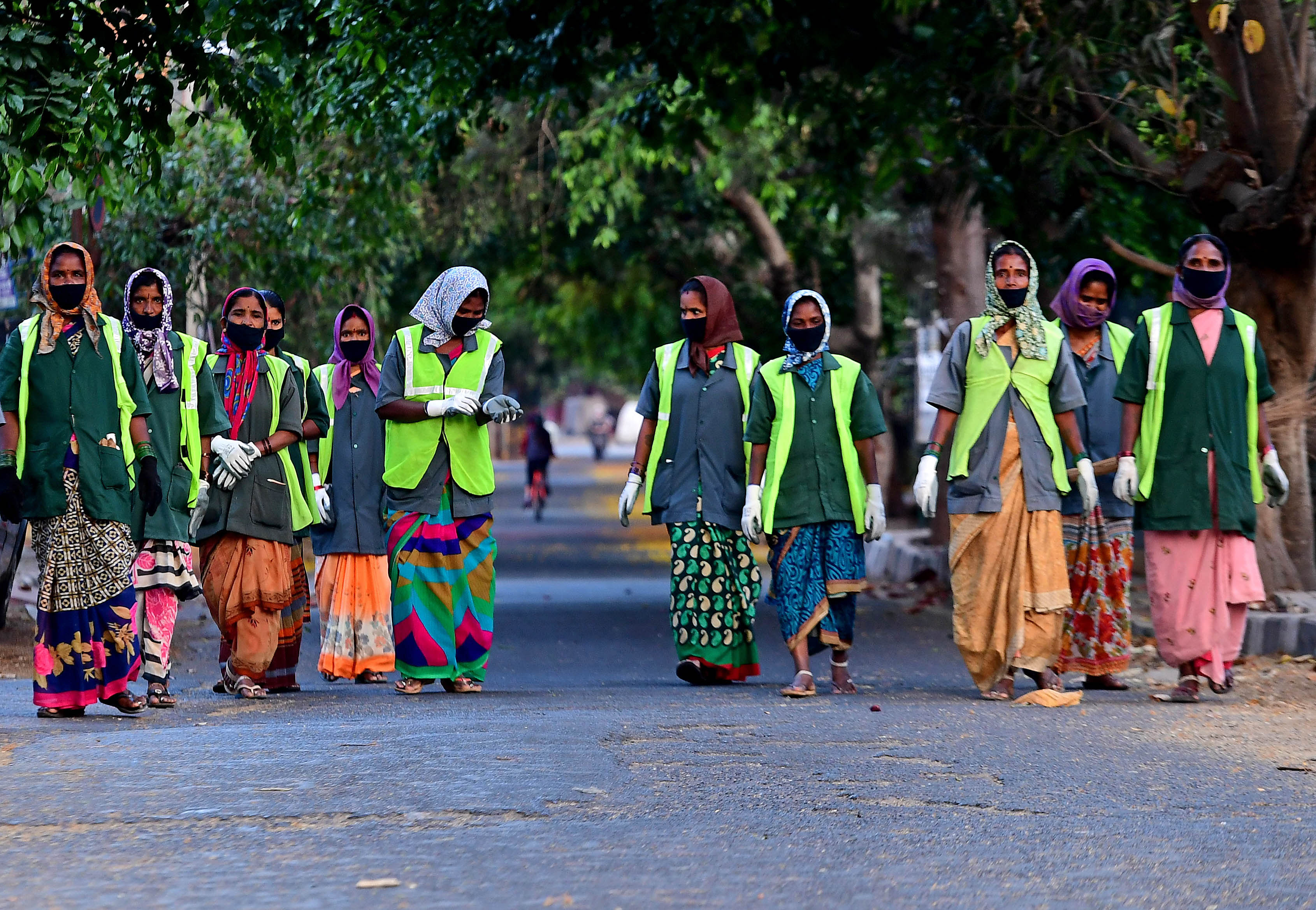With the coronavirus scare, the vulnerability of pourakarmikas (PKs) to the disease has prompted several trade unions to file a PIL in the Karnataka High Court recently. Despite the increase in disposable masks and sanitary waste in the garbage, no masks, gloves and access to water to wash hands had been provided to the workers. At a special sitting of the court on March 30, the BBMP submitted that safety equipment has now been provided. But a field study by the petitioners has found that only one ‘one-time use’ masks have been given to the sweepers and none at all to the drivers and gangmen. The HC has hence directed the state to provide safety equipment to every sanitation worker in the entire state and to provide breakfast at mustering centres and transport facilities during the lockdown.
That PKs have been exposed to these poor working conditions is nothing new. We have been seeing since decades the shameful daily sight of gangmen collecting loose garbage, standing on heaps of it in open auto-tippers and picking recyclables with their bare hands. There are also the abominable loose garbage heaps dumped often by PKs themselves at collection points/road-sides.
The much-hyped Swachh Bharat Mission has done little to change sanitation workers’ plight or to localise garbage management. And, has anything changed at all in this regard in our city despite another PIL that is ongoing in the HC since 2012?
The municipality’s emphasis has never been on ensuring sanitation workers’ rights. Other countries have mechanised garbage collection or designed it so as to avoid its manual handling to protect workers' rights to health and dignity. The solution is to similarly overhaul our entire infrastructure for garbage collection to meet these goals.
In this regard, based on submissions by CIVIC in the PIL of 2012, the HC had in December 2015 directed that all garbage transportation vehicles should be covered; that waste should not be visible to public nor exposed to open environment; and that waste collection points/depots should have covered bins/containers for separate storage of wet and dry wastes.
Despite this HC ruling four years ago, open auto-tippers are still flourishing. It is only a few months ago that the current mayor visited Indore, saw the covered collection vehicles there, which have a partition for collecting wet and dry waste separately, and insisted that BBMP should go in for similar vehicles. But this went against the policy decision already taken that separate vehicles should be used for wet and dry waste. The lack of bins/containers at secondary storage/collection points is the reason for the unsightly black spots continuing everywhere.
The tribulations of the PKs and their lack of labour rights can be traced to the contract system initiated around 25 years ago. In this regard, the June 2013 report of an official committee set up by the state government recommended regularisation of all contract PKs. The Supreme Court, in relation to the Mumbai Municipal Corporation, also held in April 2017 that sanitation work is the municipality’s responsibility, and it cannot be outsourced to contractors. Cabinet decisions were also taken in Karnataka in May 2016 and July 2017 to abolish the contract system for PKs. Yet, contrary to the SC ruling and cabinet decisions, contracts for garbage collection are being issued by the BBMP.
The HC also pointed out in September 2019 that Rule 22 of the Solid Waste Rules of 2016 required solid waste processing facilities to be set up by April 2017, and asked BBMP to submit a detailed compliance report on this. The BBMP submitted that only 1,500 tonnes out of 4,200 tonnes are being processed at seven centralised units. The rest 2,700 tonnes, the HC noted, are being dumped in unauthorised quarries.
But Section 15(t) of the Rules of 2016 also speaks about decentralised processing of wet waste at community level. BBMP seems to have completely forgotten that the HC had also ordered, as far back as November 2012 itself, that wet waste processing stations in all 198 wards should be set up “within four months”. Now, over seven years later, it is a moot question how many wards set up these centres. In November 2017, the HC had again directed all 198 ward committees (WCs) to identify land and prepare action plans for local processing of wet waste “by the next date of hearing”. But in April 2018, the HC was constrained to order the BBMP commissioner to take action against the WCs, which had failed to follow the directions of the court, and to report the action taken by him to the court. It is not known what action, if any, has been taken against recalcitrant WCs by successive commissioners as per this order.
As for the historic mountains of garbage lying at landfills, the HC had directed BBMP on several occasions to file a compliance report of action taken regarding bio-mining of these mountains. But the mountains have not melted even an inch.
Another serious issue, as per a newspaper report of February 17, is that garbage management contracts in 50 BBMP wards have been issued to the friends/followers of councillors, on the recommendations of corporators themselves. The recommendatory letters had also been published. This is in clear violation of the HC order of January 2013, wherein the court pointed out that as per Section 26(1)(k) of the KMC Act, a person shall be disqualified from being a councillor, and perhaps from contesting in future elections, if s/he is involved in the contract process of any civic works. No action to disqualify these 50 corporators appears to have been taken. Will they be standing for election, too, in September 2020? And will we and the workers have to suffer the same mess, within and outside the corporation office, forever?
(The writer is Executive Trustee of CIVIC Bangalore)
